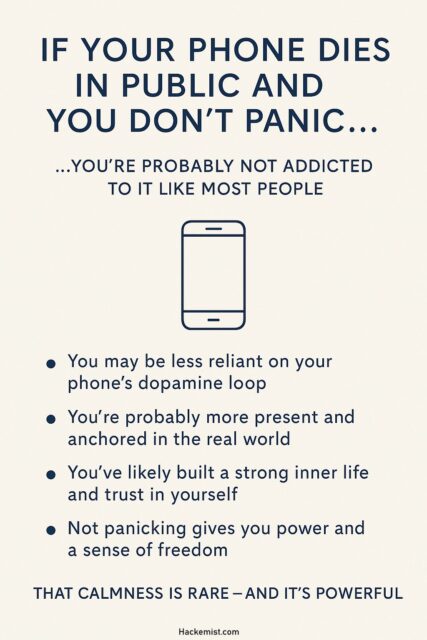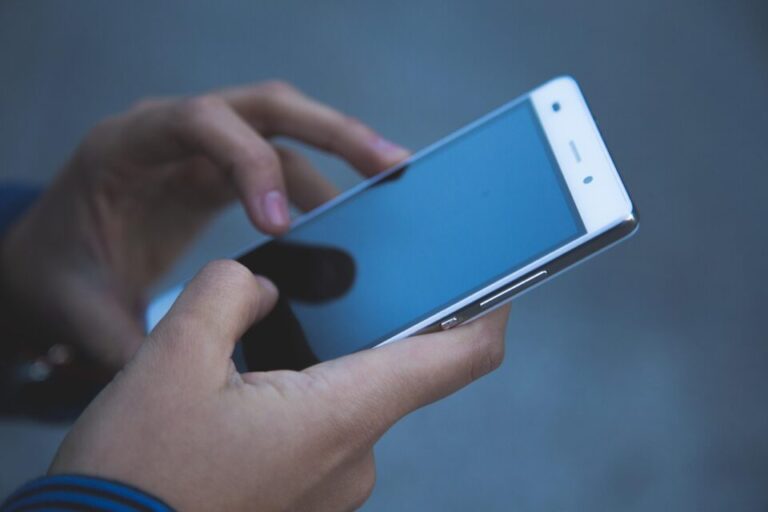We’ve all been there—out in public, halfway through a message or waiting for an Uber, when the screen suddenly goes black. Dead. Zero battery. No lifeline. No scroll. No backup.
And for a lot of people, that moment hits like a mini crisis. They fidget. They sigh. They start looking around, already plotting the nearest outlet or wondering if they should ask a stranger to borrow a charger. It’s not just inconvenience—it feels like disconnection from the world itself.
But every now and then, you’ll meet someone who doesn’t flinch when their phone dies. They just put it in their pocket, maybe stretch their legs, and keep going.
If that’s you—or even something you’ve started to move toward—it’s a sign you’re probably not as hooked as most people. And in a world where phone addiction is now baked into the design of our devices, that’s a quiet kind of freedom worth talking about.

When your phone dies… and you don’t
There’s something almost rebellious about not reacting when your phone gives out in public. Most people feel exposed, like they’ve lost their armor. But the calm ones? They seem to settle into the moment. They’re okay with just being there—with themselves, with the city, with whatever awkward silence or observation comes next.
That ability to sit with the pause instead of immediately reaching for distraction points to a kind of mental resilience. It suggests your nervous system isn’t reliant on constant stimulation. It also hints at something even more interesting:
You’re probably connected to yourself in a way most people aren’t anymore.
The dopamine loop most people are trapped in
Let’s be clear—phone addiction is real, and it’s not about weak willpower. It’s about wiring.
We now know that every swipe, like, notification, or new message gives us a little hit of dopamine. It’s the brain chemical that makes you feel rewarded. Over time, this creates a loop. You scroll because it feels good, and then you scroll more when you’re bored, anxious, or in need of validation.
A 2022 survey from Reviews.org found that Americans check their phones an average of 344 times a day. That’s once every four minutes.
Further studies reveal that individuals with higher “nomophobia” (the fear of being without your phone) had higher stress and anxiety levels, poorer sleep, and reduced focus.
When next your phone dies and you don’t panic, it says something simple but powerful: your dopamine loop isn’t running the show. You’re not compulsively checking. You’re not depending on your phone to regulate your mood. And that’s rare.
You’re probably more anchored in the real world
When we talk about addiction, we usually think about what we’re doing too much. But just as important is what we’re doing less of because of that addiction.
People who aren’t glued to their phones often:
- Notice their surroundings. They pay attention to the shape of a cloud, the smell of a food cart, or the way a child stares in wonder at pigeons.
- Talk to strangers—even if it’s just small talk with the person in front of them in line.
- Let their minds wander. They daydream, they observe, they reflect.
These aren’t just quaint behaviors. Psychologists refer to them as grounding activities. They pull you back into the present moment and deepen your relationship with your environment. And ironically, those are the very things that help regulate your nervous system more effectively than any app ever could.
I remember once sitting at a train station after a long workday. My phone died while I was replying to an email. Normally, I’d be hunting for a charger or silently cursing myself for not bringing a power bank. But that day, I just sat there.
I noticed the elderly couple beside me holding hands. A teenager across the platform was mouthing lyrics to a song, headphones in, eyes closed. The sun was starting to dip behind the buildings, casting this soft pink-orange light.
And in that moment, I realized something strange—I didn’t miss my phone. I missed this. The world. The tiny moments we usually scroll past.
What it says about your inner life
If your phone dies and you don’t panic, it’s often because you’ve built a strong inner world. That means:
- You don’t need constant distraction to feel okay.
- You trust yourself to handle boredom, awkwardness, or uncertainty.
- You’ve learned to enjoy your own company.
These might sound like small things, but in a culture obsessed with productivity, performance, and digital validation, being okay with “nothing happening” is radical.
People who aren’t addicted to their phones are usually people who have developed what psychologists call distress tolerance. They can handle discomfort without immediately needing to numb it. That includes silence. That includes boredom. That includes waiting.
Not panicking = more power than you think
Let’s not romanticize it—phones are incredibly useful. They’re how many of us work, navigate, connect, and learn. But when our relationship with them shifts from utility to dependency, something is lost.
And here’s the thing: if you can remain calm when your phone dies in public, that self-trust and presence spills into other parts of life.
You’re more likely to:
- Sit with difficult emotions rather than escape them.
- Handle conflict without spiraling.
- Show up fully in conversations without checking out.
- Create boundaries around tech and protect your time.
You’re not just “not addicted.” You’re quietly reclaiming your attention, your nervous system, and your connection to what’s real.
Final thought
The next time your phone dies in public, notice your first reaction.
Do you panic, fidget, start planning your tech resurrection?
Or do you pause, breathe, and think, Okay. I’m still here. I can handle this?
If it’s the latter, you’re not just surviving without your phone. You’re thriving without it.
That’s not just rare—it’s powerful.
